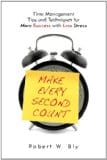Book review: Make Every Second Count
This blog is reader-supported. When you purchase something through an affiliate link on this site, I may earn some coffee money. Thanks! Learn more.
Read our review guidelines.

The book opens with the idea of using to do lists. Maybe there are some people who don’t use to do lists, but I bet there aren’t that many project managers who don’t make use of this technique. Still, a book about personal productivity would be lax if it didn’t mention lists, so I read on, hopeful of greater insights later.
The next insight I find is the revelation that watching TV shortens your life: spend an hour watching TV every day and increase your chance of dying by 11%. As scary as that statistic is (and there isn’t a full citation so I can’t check it), it isn’t going to stop me watching CSI or Gossip Girl. They are my treats for a day of work well done, and Bly talks about the value of rewarding yourself by doing fun things after priority things, so I reckon I’m OK.
I consider myself pretty productive, but I have only recently learned the value of the standard operating procedure. Bly writes:
What…do you do that’s routine and could be turned into a standard operating procedure?… Don’t engage in time-consuming problem-solving when there’s a recipe that could be followed more easily and more productively. If you had to make a pie, for instance, why would you perform chemical analysis of other pies to determine the compounds in the crust when you could just look it up in a cookbook? Yet people do the equivalent every day. What a waste!
In my writing job, I use checklists for software reviews. The list gives me a standard procedure for testing project management tools, and a framework for writing up the findings. It took a little while to develop, but I can’t tell you the relief I felt when I wrote up the first review with my new checklist. It was so much easier, and I wasn’t reinventing the wheel each time I tried out a new application.
What standard operating procedures do you have for your projects? Is there a process for starting up new projects? A directory of document templates? Standard processes don’t just make things easier, they also ensure that you don’t miss out steps along the way.
Bly also points out that most of us can’t control when we feel most productive. For me, it is the post-lunch slot that is the worst. Don’t expect much out of me if I am at my desk between 1pm and 3pm. Meetings are fine, but left to my own devices I know it takes an extra kick to move things along.
Bly’s own tip for getting that extra bit of usefulness out of yourself is to find something that can revitalise you during the day. For him, it is washing his hair (his office has a private bathroom). For you, it could be coffee with a colleague in the afternoon, making calls, or getting out of the building for a walk.
While much of the advice here is stuff I think many people will know, especially the section on saving time and money when travelling. This was quite funny to read. Europe comes across as a place with complicated plumbing and efficient trains, so I guess Bly has not had the pleasure of travelling on some of my local routes.
Bly does ask the question, “Do you want to be productive?” This is valuable: not everyone will want to make the sacrifices required to be the most productive they can be. Bly writes:
If you want to be super-productive, there are certain things you will have to give up. These things include the extravagant luxuries of sloth, inertia, laziness, and wasted idle time. If you are not willing to give these up, you must seriously question whether being more productive is truly a priority in your life. If it isn’t, that’s okay. However, don’t complain that there’s “never enough time,” and then watch 25 hours of sports on TV each weekend.
Well said.
This review first appeared on Gantthead.com.
